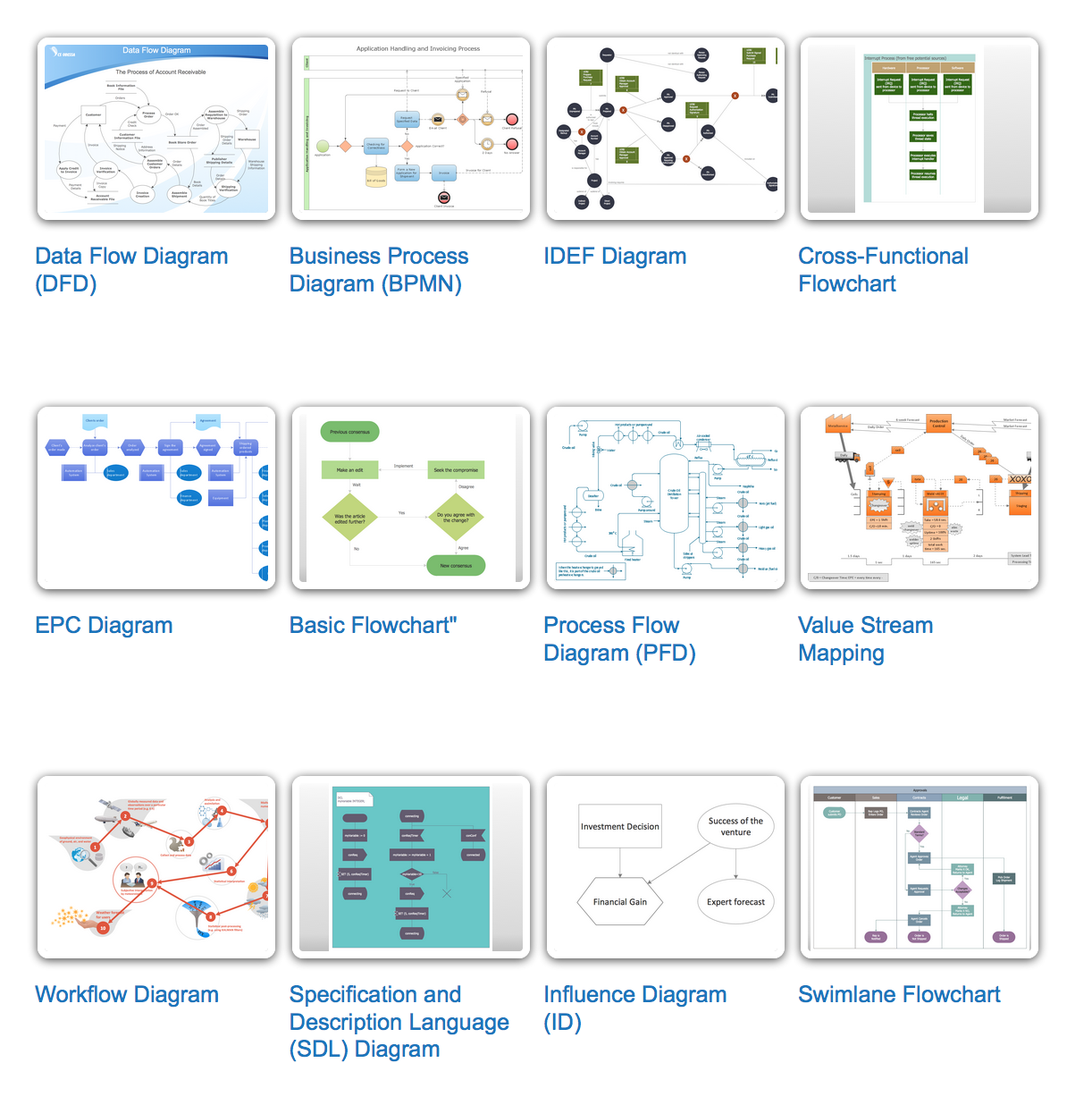Types of Flowcharts
A Flowchart is a graphical representation of process, algorithm, workflow or step-by-step solution of the problem. It shows the steps as boxes of various kinds and connects them by arrows in a defined order depicting a flow. There are twelve main Flowchart types: Basic Flowchart, Business Process Modeling Diagram (BPMN), Cross Functional Flowchart, Data Flow Diagram (DFD), IDEF (Integrated DEFinition) Flowchart, Event-driven Process Chain (EPC) Diagram, Influence Diagram (ID), Swimlane Flowchart, Process Flow Diagram (PFD), Specification and Description Language (SDL) Diagram, Value Stream Mapping, Workflow Diagram. Using the Flowcharts solution from the Diagrams area of ConceptDraw Solution Park you can easy and quickly design a Flowchart of any of these types. This solution offers a lot of special predesigned vector symbols for each of these widely used notations. They will make the drawing process of Flowcharts much easier than ever. Pay also attention for the included collection of ready Flowchart examples, samples and quick-start templates. This is business process improvement tools. If you are looking for MS Visio for your Mac, then you are out of luck, because it hasn't been released yet. However, you can use Visio alternatives that can successfully replace its functions. ConceptDraw PRO is an alternative to MS Visio for Mac that provides powerful features and intuitive user interface for the same.
Structured Systems Analysis and Design Method (SSADM) with ConceptDraw PRO
Structured Systems Analysis and Design Method (abbr. SSADM) is a method developed in Great Britain and accepted in 1993 as a national standard for information systems development and analysis. SSADM is based on Data Flow Diagrams and is characterized with presence of clear sequence of steps at projecting, analysis, and documenting of information system. It involves 6 main stages: analysis of existing system or estimation of practicability, requirements definition, determination of technical requirements and equipment cost, development of logical data model, projecting of logical requirements and specification them, physical projecting. Each of them is also divided into several steps defining the tasks that should be fulfilled at a given stage. The most important SSADM elements are flows modeling with help of DFD, data logic modeling with help of LDS (Logical Data Structure) and description of entities behavior. Applying of SSADM is easy with ConceptDraw PRO diagramming and vector drawing software and Data Flow Diagram solution.- Stakeholder Management System | Visualize Stakeholder Analysis ...
- C4ISR architecture framework - IDEF0 activity diagram | Stakeholder ...
- Stakeholder Onion Diagrams | Visualize Stakeholder Analysis ...
- Structured Systems Analysis and Design Method (SSADM) with ...
- UML Tool & UML Diagram Examples | UML Diagram | UML use ...
- Marketing plan - Circular diagram | Marketing Plan Infographic ...
- UML Diagram | Financial Trade UML Use Case Diagram Example ...
- State Machine Diagram | Diagramming Software for Design UML ...
- UML State Machine Diagram. Design Elements | Diagramming ...
- Diagramming Software for Design UML State Machine Diagrams ...
- State Diagram Example - Online Store | UML Diagram for Mac | UML ...
- State Machine Diagram | State Diagram Example - Online Store ...
- Diagramming Software for Design UML Collaboration Diagrams ...
- UML Diagram | UML Diagram Types List | Design Elements for UML ...
- Diagramming Software for Design UML Activity Diagrams ...
- Online Tool To Draw Use Case Diagram
- Flow Chart Online | Online Diagram Tool | State Diagram Example ...
- Flow Chart Online | Top 5 Android Flow Chart Apps | Online ...
- Online Diagram Tool | UML Component Diagram Example - Online ...
- Use Case Diagrams technology with ConceptDraw PRO | UML Use ...

